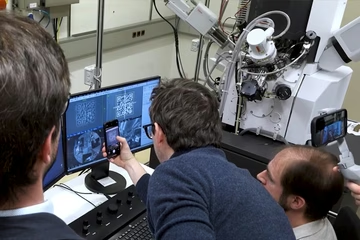Florian Bieber: Support for Jadar lithium mining project a tragic mistake of EU

Political scientist and University of Graz Professor Florian Bieber said he believes that the costs and risks of supporting the decision to go ahead with the Jadar lithium mining project in Serbia will outweigh the benefits.
“I think the cost of supporting this decision (on Rio Tinto’s Jadar lithium mining project) is much greater than the benefits – first of all, you push people away from the European Union (EU) in Serbia but also in the region, because you say we care more about your raw materials than about you as human beings. The second problem is that empowering someone like (Serbian President Aleksandar) Vucic in the region is dangerous because he is not just happy to be a strongman in Serbia, but he also has a negative influence on Bosnia, Montenegro, Kosovo, and North Macedonia. He poisons the whole region in a certain way. So there are lots of consequences of supporting him and making him more powerful that are very dangerous. The price will be very high. I think the benefits the EU gains from this project are much smaller than the risks and the costs,” Bieber told Serbian director Stevan Filipovic in the sixth episode of the Radar podcast.
As one of the experts who popularized the term “stabilocracy” – a concept often used to describe Aleksandar Vucic’s regime, where the international community allows a local autocrat to undermine democratic principles as long as they ensure regional stability – Filipovic’s guest discussed the importance of the Jadar lithium mining project for Europe and the Serbian government, the visits of German Chancellor Olaf Scholz and French President Emmanuel Macron to Belgrade, the support they offered as guests of Vucic, as well as the potential political alternatives that could shift the sociopolitical landscape in Serbia.
A miscalculation
In response to Filipovic’s comment that many citizens expected understanding and support from the European Union regarding the Jadar project, Florian Bieber explained why that support was lacking.
He said that, just like former German Chancellor Angela Merkel supported Viktor Orban because the car industry is doing good business in Hungary, German Chancellor Olaf Scholz has now decided to back Vucic in order to use the lithium from Serbia to strengthen his country’s economic interests, but also become less dependent on China.
“You ignore the fact or you convince yourself that the problems are not as bad. It’s harder to convince yourself if you are a Green in Germany because you are supposed to care about the environment. Of course, you care more about the environment in your own country, but you should be more transnational in your conviction. But then maybe you tell yourself ‘Well, it helps reduce the Chinese influence, maybe also in Serbia,’ and then there’s also this whole narrative – which I think is a mistake – but I’m not saying that people don’t believe it, that it will help attract Serbia to the West. You saw a lot of Western reporting about Macron’s visit, but also Scholz’s visit to say it kind of links Serbia closer to the West, and detaches it from Russia and China. I think it’s completely wrong,” said Bieber, Radar reported.
In his opinion, the EU’s support for the Jadar lithium mining project is a tragic mistake.
“The cost of supporting this decision is much greater than the benefits – first of all, you push people away from the EU in Serbia but also in the region, because you say we care more about your raw materials than about you as human beings. The second problem is that empowering someone like Vucic in the region is dangerous because he is not just happy to be a strongman in Serbia, but he also has a negative influence on Bosnia, Montenegro, Kosovo, and North Macedonia. He poisons the whole region in a certain way. So there are lots of consequences of supporting him and making him more powerful that are very dangerous. The price will be very high. I think the benefits the EU gains from this project are much smaller than the risks and the costs,” said Bieber.
Mixed messages
Bieber said he believes Vucic will not make the same mistakes as Milosevic, but noted that twelve full years of raising tensions, paranoia, and antagonism will inevitably have consequences.
Filipovic pointed out that this stance from the Western part of the international community has drastically increased Euroscepticism within the pro-European part of Serbia, and that the “dream of European values” has clashed with mere economic interests.
He asked Bieber if Vucic, as someone who used to say that “Serbia should kill a hundred Muslims for one Serb,” has space to engage in politics in such a Europe, and Bieber responded that no European country has a wartime legacy comparable to the nations that emerged from the breakup of the former Yugoslavia, that there is no equivalent, which makes it hard to answer.
“Of course, we have politicians in a number of EU countries on the far right, they are far-right politicians, they are extremists, they would not state we are going to kill a hundred Muslims. Of course, this was stated in the context of the war so…you have plenty of anti-Muslim politicians in Central and Western Europe, they wouldn’t say it, but they would send messages which say a similar thing. If they would say that, I think their career probably would be over and certainly they would not be seen as welcome by many others,” said Bieber.
“I think the problem with the EU’s support for Vucic, at least in the initial phases, was that they believed, wrongly of course, that he changed, that he wasn’t that man who said in 1996, 1995 those horrific statements, so they thought that he was going to be different ten years or fifteen years later,” the professor explained.
He said that there is no European master plan that wants Vucic or autocrats, but that it has more to do with the fact that, since 2008, the EU has been in a period of nearly constant crises and that it has been distracted, and that some politicians in the region, like Vucic, were very good at reading global trends and shifting power dynamics.
“The EU is as good and as bad as its member states, its parties, and politicians. When you ask me if the EU was the wrong dream, I would say no, I had the same dream and many people did, that this was a value-based community, within and outside, and it still is to some degree. It’s much less than I would hope it to be, much less than I would hope it to be when it comes to the Western Balkans or to Serbia. It missed a lot of opportunities, it made bad choices, but it’s not the EU but individual leaders, and individual politicians. It’s Angela Merkel and her support for Aleksandar Vucic, it’s the Austrian politicians…It’s not that there is one master plan to say ‘We want Vucic’ or ‘We want autocrats.’ It’s much more that we have, on the side of the Serbian president, someone who knows exactly how to manoeuvre and how to manipulate these European leaders who, and I think this is the big, important thing – the European Union has been distracted. I would say after 2008, we have the economic crisis which really took all the attention of the EU for a few years…There are some politicians in the region, and Vucic is the best example, who are very good at reading these global trends and these shifting power dynamics,” said Bieber.
Missed expectations
The professor said he does not blame the EU leaders in 2012, 2013, or even 2014 for thinking that Vucic, as a transformed leader, would offer stability in the state and region.
“In 2008, 2009, when the (Serbian Progressive Party) SNS was established, there was a lot of support from embassies at the time, and I think their calculation was very clear: they’d seen the Serbian Radical Party become the strongest party in the 2000s, stronger than the Democratic Party, and always threatening the balance, the government was always fragile, the (Democratic Opposition of Serbia) DOS government, the (Democratic Party) DS governments, the (Democratic Party of Serbia) DSS coalitions, they were always fragile, and so they saw well here’s a party that breaks away from the Radical Party, which is speaking European talk, talks about EU integration, and distances itself, in a very limited way, but somehow, just about enough, from the Radical Party. And that seemed like a good deal at the time, to say well let’s support them because that can create a more normal political environment in Serbia, where you don’t have – everybody has to be on one side in coalition and then you have the others who threaten democracy. The assumption back then, this was before the rise of far-right parties around Europe and elsewhere was like, well the normal way is that a country has mainstream parties, conservatives, social democrats, and they’re all pro-European. This is what happened in Croatia, the (Croatian Democratic Union) HDZ from (late Croatian President and HDZ leader Franjo) Tudjman’s nationalist authoritarian became more conservative, more moderately kind of European Christian democrats, they became pro-European, pursued integration, then the country joined the EU and then they become normal political parties. This was the logic. The logic was the same would happen with the SNS, that it would become sort of a Serbian HDZ so to speak. A conservative party which might be nationalist but it wants to join the European Union and would do those things….But Vucic was lying to them, and he was very good at it….They did not understand what Vucic was doing once he was in power…I remember talking to many people in Serbia at the time, from the civil society, many of them were also hopeful about Vucic. Not everybody, but I do remember talking to quite a few people in Serbia who were at the time believing that Vucic could actually do difficult things and deliver,” said Bieber.
Kakvo je tvoje mišljenje o ovome?
Učestvuj u diskusiji ili pročitaj komentare





 Srbija
Srbija
 Hrvatska
Hrvatska
 Slovenija
Slovenija


























































